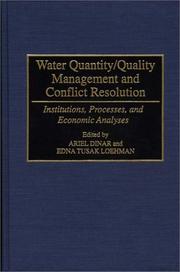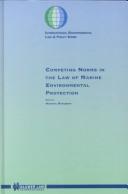| Listing 1 - 8 of 8 |
Sort by
|

ISBN: 0275947823 Year: 1995 Publisher: Westport, Conn. London Praeger
Abstract | Keywords | Export | Availability | Bookmark
 Loading...
Loading...Choose an application
- Reference Manager
- EndNote
- RefWorks (Direct export to RefWorks)
Book
ISBN: 9780415534703 9780415534710 9780203113202 9781136285868 9781136285813 9781136285851 0415534704 0415534712 Year: 2013 Publisher: Abingdon: Routledge,
Abstract | Keywords | Export | Availability | Bookmark
 Loading...
Loading...Choose an application
- Reference Manager
- EndNote
- RefWorks (Direct export to RefWorks)
Water supply --- Water security --- Water resources development --- Government policy --- Water-supply --- Water security. --- Water resources development. --- Government policy. --- Water supply - Government policy
Book
ISBN: 1283364344 9786613364340 9264119280 9264119272 Year: 2011 Publisher: Paris : OECD,
Abstract | Keywords | Export | Availability | Bookmark
 Loading...
Loading...Choose an application
- Reference Manager
- EndNote
- RefWorks (Direct export to RefWorks)
This report addresses multilevel governance challenges in water policy implementation and identifies good practices for coordinating water policy across ministries, between levels of government, and across local actors at subnational level. Based on a methodological framework, it assesses the main “coordination gaps” in terms of policymaking, financing, information, accountability, objectives and capacity building, and provides a platform of existing governance mechanisms to bridge them. Based on an extensive survey on water governance the report provides a comprehensive institutional mapping of roles and responsibilities in water policy-making at national/subnational level in 17 OECD countries. It concludes on preliminary multilevel governance guidelines for integrated water policy.
Water-supply -- Government policy -- OECD countries. --- Water-supply -- OECD countries -- Management. --- Water-supply --- Civil & Environmental Engineering --- Engineering & Applied Sciences --- Environmental Engineering --- Government policy --- Management --- Management. --- Availability, Water --- Water availability --- Water resources --- Natural resources --- Public utilities --- Water resources development --- Water utilities
Book
ISBN: 3531165089 3531913778 Year: 2009 Publisher: Wiesbaden : VS Verlag fur Sozialwissenschaften / GWV Fachverlage GmbH, Wiesbaden,
Abstract | Keywords | Export | Availability | Bookmark
 Loading...
Loading...Choose an application
- Reference Manager
- EndNote
- RefWorks (Direct export to RefWorks)
In many countries, water institutional reforms (like the establishment of water user associations or the introduction of pricing mechanisms) are conducted in order to achieve more sustainable, efficient, and equitable water usage. Often, however, these reforms do not meet their objectives. Based on a comparative analysis of Kyrgyzstan and Tajikistan, this study highlights the long neglected role of politics. It shows how a neopatrimonial regime context impacts the reform process, focusing on the decision making, the agricultural sector, the local governance institutions, internal water-institutional linkages, and the role of international donor agencies.
Governance. --- Water resources development -- Kyrgyzstan. --- Water resources development -- Tajikistan. --- Water-supply -- Government policy -- Kyrgyzstan. --- Water-supply -- Government policy -- Tajikistan. --- Water-supply -- Political aspects -- Kyrgyzstan. --- Water-supply -- Political aspects -- Tajikistan. --- Political Science --- Business & Economics --- Law, Politics & Government --- Political Science - General --- Agricultural Economics --- Water resources development --- Political science. --- Comparative politics. --- Political Science and International Relations. --- Political Science. --- Comparative Politics. --- Energy development --- Natural resources --- Water-supply --- Comparative political systems --- Comparative politics --- Government, Comparative --- Political systems, Comparative --- Political science --- Administration --- Civil government --- Commonwealth, The --- Government --- Political theory --- Political thought --- Politics --- Science, Political --- Social sciences --- State, The

ISBN: 904110657X 9789041106575 Year: 1997 Publisher: London: Kluwer law international,
Abstract | Keywords | Export | Availability | Bookmark
 Loading...
Loading...Choose an application
- Reference Manager
- EndNote
- RefWorks (Direct export to RefWorks)
Water --- Water-supply --- Eau --- Law and legislation --- Congresses --- Government policy --- International cooperation --- Droit --- Congrès --- Approvisionnement --- Politique gouvernementale --- Coopération internationale --- Law and legislation. --- Government policy. --- International cooperation. --- Congrès --- Coopération internationale --- Congresses. --- Water - Law and legislation --- Water-supply - Government policy --- Water-supply - International cooperation
Book
ISBN: 928900259X Year: 2011 Publisher: Geneva : World Health Organization,
Abstract | Keywords | Export | Availability | Bookmark
 Loading...
Loading...Choose an application
- Reference Manager
- EndNote
- RefWorks (Direct export to RefWorks)
Extreme weather events including floods and droughts are increasing in frequency and intensity. They affect the operation of water-supply drainage and sewerage infrastructure and the functioning of wastewater treatment plants thereby affecting the protection of public health. Parties to the Protocol on Water and Health reviewed experience and good practice in Europe through a broad consultative process to devise the present guidance. This publication describes how adaptation policies should consider the new risks from extreme weather events how vulnerabilities can be identified and which manag
Municipal water supply -- Corrupt practices. --- Municipal water supply -- Government policy. --- Sanitation -- Government policy. --- Environmental Health --- Engineering --- Atmosphere --- Ecological and Environmental Processes --- Meteorological Concepts --- Disasters --- Public Health --- Communicable Disease Control --- Health Occupations --- Environment --- Public Health Practice --- Ecological and Environmental Phenomena --- Technology, Industry, and Agriculture --- Environment and Public Health --- Disciplines and Occupations --- Technology, Industry, Agriculture --- Health Care --- Biological Phenomena --- Phenomena and Processes --- Sanitation --- Disaster Planning --- Weather --- Climatic Processes --- Sanitary Engineering --- Water Supply --- Ecological and Environmental Phenomena. --- Delivery of Health Care.
Book
ISBN: 3030467694 3030467686 9783030467685 Year: 2020 Publisher: Basingstoke: Palgrave MacMillan,
Abstract | Keywords | Export | Availability | Bookmark
 Loading...
Loading...Choose an application
- Reference Manager
- EndNote
- RefWorks (Direct export to RefWorks)
With the consequences of climate change and biodiversity loss becoming more and more apparent, both the protection of water resources and water-related ecosystems as well as protection from water, that is flood protection policies, have become increasingly important. This book explores the latest applications of network analysis concepts and measures to the study and practice of water governance. Given the holistic complexity of water governance, it covers individual water governance aspects such as flood protection and fisheries, as well as overarching concepts like integrated water management and social-ecological interactions. The book provides an overview of current water governance issues, network analytic concepts as well as implications for practice. The main body of the text is made up of eight case studies by world-leading environmental governance scholars, each of which addresses one water-related challenge by applying a variety of network approaches. The first part of the book highlights network dispersion and fragmentation, the second focuses on how such fragmentation in networks can be overcome and the third deals with specific roles of actors in networks. This collection is a key resource for scholars and practitioners interested in water governance all over the world. It provides readers with an overview of the potential of network analytic concepts for research on complex governance problems.
Environment. --- Environmental management. --- Environmental policy. --- Environmental geography. --- Environment Studies. --- Water Policy/Water Governance/Water Management. --- Environmental Policy. --- Environmental Geography. --- Environmental Management. --- Geography --- Environment and state --- Environmental control --- Environmental management --- Environmental protection --- Environmental quality --- State and environment --- Environmental auditing --- Environmental stewardship --- Stewardship, Environmental --- Environmental sciences --- Management --- Government policy --- Balance of nature --- Biology --- Bionomics --- Ecological processes --- Ecological science --- Ecological sciences --- Environment --- Environmental biology --- Oecology --- Population biology --- Ecology --- Water-supply - Government policy. --- Water-supply - Management. --- Water resources development. --- Water resources development - Government policy. --- Water-supply --- Water resources development
Book
ISBN: 9048193664 9786613469847 1283469847 9048193672 Year: 2011 Publisher: Dordrecht : Springer,
Abstract | Keywords | Export | Availability | Bookmark
 Loading...
Loading...Choose an application
- Reference Manager
- EndNote
- RefWorks (Direct export to RefWorks)
One of the early set of reforms that South Africa embarked on after emerging from apartheid was in the water sector, following a remarkable, consultative process. The policy and legal reforms were comprehensive and covered almost all aspects of water management including revolutionary changes in defining and allocating rights to water, radical reforms in water management and supply institutions, the introduction of the protection of environmental flows, and major shifts in charging for water use and in the provision of free basic water. Over ten years of implementation of these policy and legislative changes mean that valuable lessons have already been learned and useful experiences gained in the challenge of effective water resources management and water services provision in a middle income country. Transforming Water Management in South Africa analyses and documents these experiences for the benefit of water managers and policy makers in the country, the developing world and the international community at large.
Water resources development -- South Africa. --- Water-supply -- Government policy -- South Africa. --- Water-supply -- South Africa -- Management. --- Business & Economics --- Agricultural Economics --- Economic History --- Water resources development --- Water-supply --- Watersheds --- Municipal water supply --- Watershed management --- Government policy --- Law and legislation --- Watershed development --- Cities and towns --- Urban water --- Water, Municipal --- Water, Urban --- Availability, Water --- Water availability --- Water resources --- Management --- Environmental management. --- Environmental law. --- Environmental policy. --- Sustainable development. --- Development economics. --- Agricultural economics. --- Environmental economics. --- Economics. --- Environmental Economics. --- Water Policy/Water Governance/Water Management. --- Agricultural Economics. --- Environmental Law/Policy/Ecojustice. --- Sustainable Development. --- Development Economics. --- Ecosystem management --- Municipal engineering --- Natural resources --- Public utilities --- Water utilities --- Energy development --- Development, Sustainable --- Ecologically sustainable development --- Economic development, Sustainable --- Economic sustainability --- ESD (Ecologically sustainable development) --- Smart growth --- Sustainable development --- Sustainable economic development --- Economic development --- Environment law --- Environmental control --- Environmental protection --- Environmental quality --- Environmental policy --- Law --- Agrarian question --- Agribusiness --- Agricultural economics --- Agricultural production economics --- Agriculture --- Production economics, Agricultural --- Land use, Rural --- Economics --- Environmental aspects --- Economic aspects --- Environment and state --- Environmental management --- State and environment --- Environmental auditing --- Environmental stewardship --- Stewardship, Environmental --- Environmental sciences
| Listing 1 - 8 of 8 |
Sort by
|

 Search
Search Feedback
Feedback About UniCat
About UniCat  Help
Help News
News